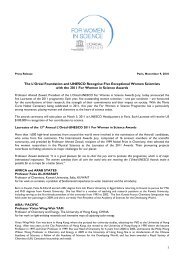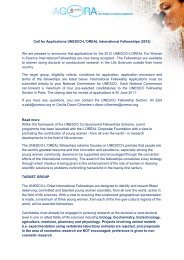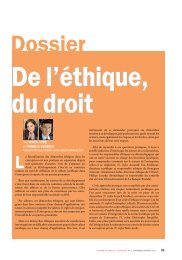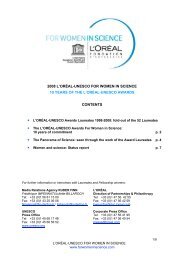2011 EDITION
2011 EDITION
2011 EDITION
You also want an ePaper? Increase the reach of your titles
YUMPU automatically turns print PDFs into web optimized ePapers that Google loves.
“More intensive farming<br />
and the scientific<br />
management of<br />
agricultural products,<br />
especially medicinal<br />
products, is my vision<br />
of growth driven<br />
by agriculture in<br />
Cameroon.”<br />
Justine germo<br />
Nzweundji<br />
CAMEROON<br />
Plant biotechnoloy<br />
Benign prostatic hyperplasia (BPH) is a relatively common<br />
enlargement of the prostate that affects men over 50. It<br />
not only causes discomfort, but also can lead to severe<br />
medical complications if left untreated.<br />
One of the treatments for BPH used in developed<br />
countries is extracted from the bark of Prunus africana or<br />
pygeum, a wild evergreen tree that grows in the mountainous<br />
regions of sub-Saharan Africa. Traditionally used for<br />
firewood and timber, the plant’s bark is mainly used by the<br />
pharmaceutical industry<br />
Current methods of harvesting and processing Prunus<br />
bark are still rudimentary and it is very difficult to get Prunus<br />
seeds to germinate. Moreover, several species depend on<br />
Prunus africana for their existence, which raises a real risk<br />
of reducing the natural biodiversity of Africa’s mountainous<br />
regions.<br />
Justine Nzweundji, 33, is a doctoral student in plant biology<br />
at the University of Yaounde, Cameroon, and a senior<br />
technician at the Institute of Medical Research and Study<br />
of Medicinal Plants, where she works on the tissue culture<br />
of plants with medicinal value. Her research could help<br />
lower the risk of eroding biodiversity in the region as well as<br />
reduce poverty in rural communities.<br />
HOST INSTITUTION:<br />
Department of Environmental Sciences,<br />
University of Tuscia, Viterbo, Italy<br />
HOST INSTITUTION:<br />
Center for Tropical Agriculture,<br />
University of Florida, Homestead,<br />
USA<br />
As part of her fellowship, Justine<br />
Nzweundji plans to develop techniques to<br />
propagate large quantities of disease-free<br />
clones of genetically uniform plant material<br />
that can be made available for commercial<br />
exploitation. She hopes to obtain the<br />
best results for the conservation and propagation<br />
of plant embryos containing the<br />
highest concentration of the active components<br />
sought by the pharmaceutical<br />
industry. These components could then<br />
be produced in vitro as an alternative to<br />
harvesting the bark. She plans to share her<br />
knowledge with local farmers, NgOs and<br />
commercial enterprises in Cameroon and<br />
in other countries interested in the sustainable<br />
exploitation of Prunus africana.<br />
UZbEKISTAN<br />
Nilufar<br />
Plant biochemistry and pharmacology Mamadalieva<br />
Eighty percent of the world’s population<br />
uses medicinal plants as the sole<br />
source of therapeutic treatments. A<br />
number of treatments, including anticancer<br />
drugs, are derived from biologically<br />
active molecules extracted from<br />
plants. Yet only 10% of the world’s flora<br />
has been assessed for medical use,<br />
which means there is a vast reservoir of<br />
molecular diversity in plants waiting to<br />
be explored.<br />
With a PhD in plant chemistry, Nilufar<br />
Mamadalieva, 35, has worked at the<br />
Institute of Chemistry of Plant Substances<br />
in Tashkent, Uzbekistan since<br />
2001. She has dedicated her research<br />
to the study of biologically active compounds<br />
from native plant species.<br />
Through her fellowship, Nilufar plans to extract molecules<br />
from samples of the native plants of Uzbekistan<br />
and to test each compound’s ability to inhibit the<br />
proliferation of cancer cells using cultured mammalian<br />
stem cells. She will use analytical techniques such as<br />
nuclear magnetic resonance (NMR), a spectrometry<br />
technique, to identify which protein in the cancer cell<br />
is inhibited by their activity. She will then evaluate the<br />
effectiveness of the anticancer activity of the isolated<br />
plant compounds.<br />
When she returns to Uzbekistan, Nilufar Mamadalieva<br />
intends to continue her research by launching preclinical<br />
and toxicological studies using the new compounds.<br />
She also hopes to share her experiences with<br />
her colleagues and to act as a role model for young<br />
scientists in her country.<br />
“Plants are an incredible<br />
resource that offers an<br />
opportunity to develop<br />
new natural drug treatments<br />
to fight cancer and other<br />
diseases.”
















